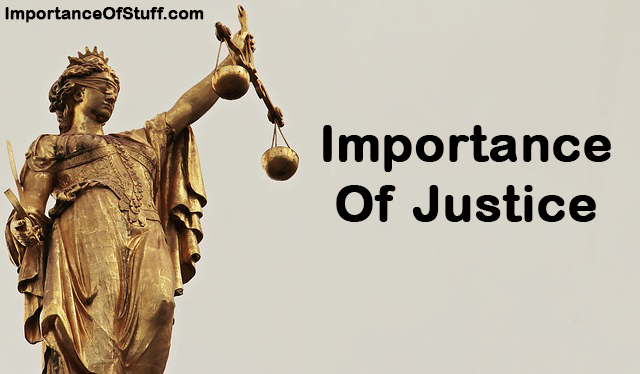The sense of justice is inherent in us. We know, sometimes vaguely and sometimes explicitly, what is right and what is wrong. Some ideas we are born with, while others are instilled in us throughout our lives. A child cries out ‘not fair’ when someone pushed him on the playground and gets the ball, and complains to an adult even when he has not been told that pushing on the playground is not right. It is the inborn sense of justice that is miffed on this occasion. It is this sense of justice that directs us through our lives, dictating our every step and shaping us into mature, well-rounded individuals. In this article, let us look at justice from a personal and a social perspective.

Checks crime
Justice is important because it is what keeps crime under control in a society. We are aware that there is a judicial system in place, and that we will be eventually tried for our crimes; if we are found guilty, we will suffer the punishment, which will affect not only us, but our loved ones as well. Having a criminal record affects not just our present or the duration of the time we serve; it has long reaching effects on both our professional career and our personal life. It is because we are aware that the system will mete out justice to us sooner or later that we are careful about toeing the line.
Provides motivation
The most important contribution of justice, of course, is the retribution and rewards it metes out to the deserving. If we knew that all of our actions will go unpunished and unrewarded, it would lead to anarchy. Everyone would be entitled to act the way they please without fearing any kind of justice befalling on them. When a crime has been committed against you, you seek justice from the judicial system, hoping that the perpetrator will be adequately punished for the wrong that they did to you. Similarly, when you do something good, there is the expectation that you will be duly rewarded, and that will be motivation to keep doing the good work.
Instates faith
Everyone believes in some form of justice- meted by man or the divine form. It is the ability to mete out proper justice that forms the keystone of any faith- be it faith in the divine or faith in the governing body. A government that takes a very long time to mete out justice, or is corrupt and tampers with the handing out of rewards and punishments, is duly considered an incompetent one, and sows seeds of discontent among the people. Similarly, when you have strong belief in a divine entity, you hope that it will reward you for your good work and punish those that commit crimes or unethical acts. If your expectations are not met, you start to question your faith.
Differentiates right from wrong
We know what is right and what is wrong from an inherent sense of justice. While many definitions of right and wrong keep changing from time to time and place to place, some factors remain stable. For instance, it is never right to take a life for selfish purposes. That has always been a crime, and we know that it is wrong because we are punished for such an action. When a child is punished for fighting with a friend, they are made aware that what they did was wrong, and the wrongness is impressed upon them by the act of punishment. The practical execution of justice is far more efficient in explaining the importance of justice than any amount of theory.
Dispute settlement
It is thanks to an existing and functional judicial system that we know that our disputes can be solved in a civil manner. A conflict over property need not be settled at home or in the streets in a blood and criminal manner; the matter can be taken to court and settled under the administration of those trained at law. If this system had not been there, there would be an alarming number of fratricides, patricides, and matricides in the world.
Also read: Importance of democracy
The judicial system of a nation puts every person in their own place, and fights corruption in the process. Ensuring justice is the chief goal of the judicial system, and it takes every measure necessary to ensure the same. By deciding on rights and duties of each category of person within its jurisdiction, it ensures equality of opportunities, protects the minorities and the challenged, and ensures that every person acts within their limits. For instance, attempting to force a legally adult woman to marry is a crime in the justice system, and so is selling your own daughter. The judicial system takes into account human relationships, and overrides them where necessary, in order to ensure full justice for all.